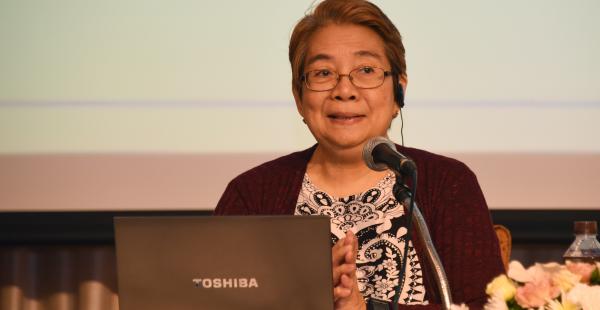
Public Lecture on IPCC Special Report on 1.5° C Global Warming in Thailand
The IPCC Special Report on Global Warming of 1.5° C makes a crucial contribution to understanding global impacts and raising ambitions. Therefore, Thailand’s Office of Natural Resources and Environmental Policy and Planning (ONEP) organised a public lecture with one of the lead authors, Dr Rosa Perez, to discuss the highlights of the published report.
With the adoption of the Paris Agreement in December 2015, many hopes rest on the world’s countries and their national climate action plans. The past two years have seen roadmaps laid out to lower emissions, improve resilience to climate change impacts and keep the increase in the global average temperature below 2° C above pre-industrial levels, while aiming for a 1.5° C threshold to significantly reduce the risks and impacts of climate change. However, the latest IPCC report reveals some hard-to-swallow facts that suggest that these national pledges are not enough.
On 25 October 2018, the Office of Natural Resources and Environmental Policy and Planning (ONEP), Thailand’s focal point for climate change issues, and the Thailand Research Fund (TRF), together with GIZ, organised a Public Lecture on the IPCC Special Report on Global Warming of 1.5° C. The event provided an opportunity to discuss the report’s findings with one of the lead authors, Dr Rosa Perez, and possible implications for Thailand. A Research Fellow at the Manila Observatory and a member of the National Panel of Technical Experts for the Climate Change Commission, Dr Perez was one of the 91 experts from 40 countries who contributed to the landmark report.
Her lecture provided more context on the report’s results and the challenges for countries to achieve the common temperature goal. The presentation covered mitigation, adaptation and long-term development goals. Dr Perez said national pledges are not enough to limit global warming to 1.5° C. As IPCC reports are based on accumulated evidence and reviewed scientific papers, the need for more country-specific climate change research to provide more accurate information on the impacts and potentials was highlighted by the keynote speaker. According to the IPCC report, ‘[i]f emissions continue at their present rate, human-induced warming will exceed 1.5° C by around 2040. Pathways limiting global warming to 1.5° C with no or limited overshoot would require rapid and far-reaching transitions in energy, land, urban and infrastructure (including transport and buildings), and industrial systems (high confidence).’
Dr Perez concluded by saying that it is up to countries to find a way forward that is not detrimental to their economic development but that contributes to global efforts under the Paris Agreement. There are ways that this can be done.
ONEP, as the UNFCCC and IPCC focal point, took advantage of the event for a broader discussion on how climate science can support Thailand’s climate change policies and provide new inputs to be taken into consideration for the NDC update.
The video recording of the public lecture is available here
Presentation by Dr Rosa Perez: Key Messages IPCC Special Report
Further information on Thai-German climate cooperation is available here

